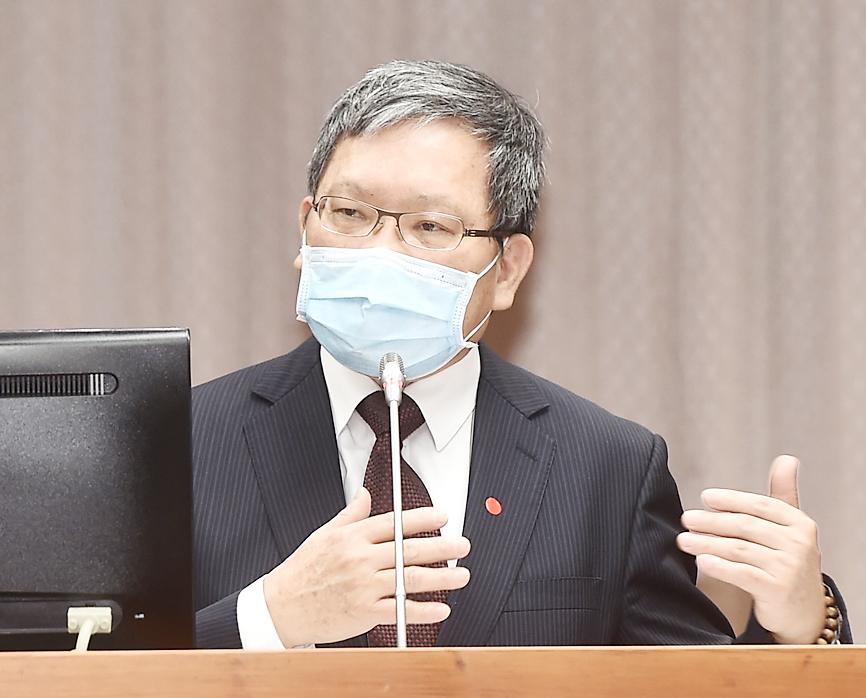Taiwan’s exclusion from the Regional Comprehensive Economic Partnership (RCEP) would have little effect on local exporters, because most firms already have a presence in Southeast Asia to take advantage of the favorable tariff terms there, government officials said yesterday.
Fifteen Asia-Pacific nations on Sunday signed the free-trade deal to form a trade bloc that accounts for nearly 30 percent of global GDP.
Minister of Finance Su Jain-rong (蘇建榮) told a meeting of the legislature’s Finance Committee that tariffs are already exempted on about 70 percent of Taiwanese shipments to RCEP markets.

Photo: Chien Jung-feng, Taipei Times
“The formation of the trade body, which is to expand the scope of tariff concessions [between the 15 member nations] from the current 90 percent to 92 percent, would have a very limited impact on Taiwan’s competitiveness,” Su said.
The difference of 2 percentage points is mild, he added.
Lawmakers from across party lines voiced concern that Taiwan would be marginalized internationally after failing to join the trade body and because of the transition in power in the US after US President Donald Trump lost the election.
RCEP members have negotiated trade terms for the past eight years during which time major Taiwanese companies have made inroads in ASEAN markets, giving them access to free trade, Su said.
The government has also encouraged local companies to diversify their investments beyond China under the New Southbound Policy, he added.
The National Development Council shared similar observations, saying that Taiwan-made semiconductors make up 60 percent of shipments to RCEP destinations and there is no tariff on semiconductors and related products due to international technology pacts and protections.
Some RCEP member nations have lowered tariffs to zero for particular technology products to remain competitive globally, the council said in a statement, explaining why tariffs are already not charged on about 70 percent of Taiwanese exports.
US-China trade tensions and the COVID-19 pandemic have awakened companies to the need for risk diversification and the danger of overdependence on a single market, the council said.
As a result, companies are restructuring their supply chains and speeding up digital transformation, it said.
Global supply realignment and the ability to develop a digital economy might become more important and relevant to supporting the economy than tariff reductions, the council said.

UNCERTAINTY: Innolux activated a stringent supply chain management mechanism, as it did during the COVID-19 pandemic, to ensure optimal inventory levels for customers Flat-panel display makers AUO Corp (友達) and Innolux Corp (群創) yesterday said that about 12 to 20 percent of their display business is at risk of potential US tariffs and that they would relocate production or shipment destinations to mitigate the levies’ effects. US tariffs would have a direct impact of US$200 million on AUO’s revenue, company chairman Paul Peng (彭雙浪) told reporters on the sidelines of the Touch Taiwan trade show in Taipei yesterday. That would make up about 12 percent of the company’s overall revenue. To cope with the tariff uncertainty, AUO plans to allocate its production to manufacturing facilities in

Taiwan will prioritize the development of silicon photonics by taking advantage of its strength in the semiconductor industry to build another shield to protect the local economy, National Development Council (NDC) Minister Paul Liu (劉鏡清) said yesterday. Speaking at a meeting of the legislature’s Economics Committee, Liu said Taiwan already has the artificial intelligence (AI) industry as a shield, after the semiconductor industry, to safeguard the country, and is looking at new unique fields to build more economic shields. While Taiwan will further strengthen its existing shields, over the longer term, the country is determined to focus on such potential segments as

TAKING STOCK: A Taiwanese cookware firm in Vietnam urged customers to assess inventory or place orders early so shipments can reach the US while tariffs are paused Taiwanese businesses in Vietnam are exploring alternatives after the White House imposed a 46 percent import duty on Vietnamese goods, following US President Donald Trump’s announcement of “reciprocal” tariffs on the US’ trading partners. Lo Shih-liang (羅世良), chairman of Brico Industry Co (裕茂工業), a Taiwanese company that manufactures cast iron cookware and stove components in Vietnam, said that more than 40 percent of his business was tied to the US market, describing the constant US policy shifts as an emotional roller coaster. “I work during the day and stay up all night watching the news. I’ve been following US news until 3am

COLLABORATION: Given Taiwan’s key position in global supply chains, the US firm is discussing strategies with local partners and clients to deal with global uncertainties Advanced Micro Devices Inc (AMD) yesterday said it is meeting with local ecosystem partners, including Taiwan Semiconductor Manufacturing Co (TSMC, 台積電), to discuss strategies, including long-term manufacturing, to navigate uncertainties such as US tariffs, as Taiwan occupies an important position in global supply chains. AMD chief executive officer Lisa Su (蘇姿丰) told reporters that Taiwan is an important part of the chip designer’s ecosystem and she is discussing with partners and customers in Taiwan to forge strong collaborations on different areas during this critical period. AMD has just become the first artificial-intelligence (AI) server chip customer of TSMC to utilize its advanced